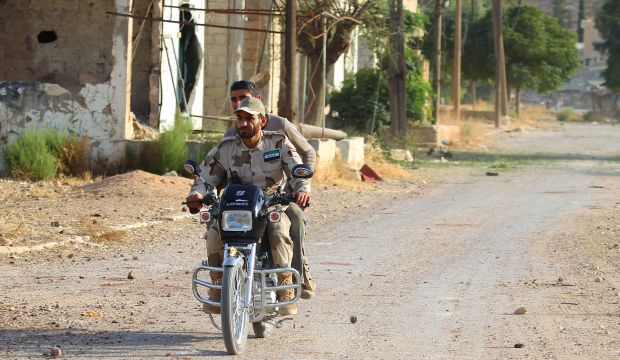
Fighters from Tajammu Al-Izza group, part of the Free Syrian Army (FSA), ride on a motorbike in Latamneh city that was hit on Wednesday by Russian airstrikes, in the northern countryside of Hama, Syria, on October 2, 2015. (REUTERS/Ammar Abdullah)
Russian warplanes, in a second day of strikes, bombed a camp run by rebels trained by the United States Central Intelligence Agency, the group’s commander said, putting Moscow and Washington on opposing sides in a Middle East conflict for the first time since the Cold War.
Senior US and Russian officials spoke for just over an hour by secure video conference on Thursday, focusing on ways to keep air crews safe, the Pentagon said, as the two militaries carry out parallel campaigns with competing objectives.
“We made crystal clear that, at a minimum, the priority here should be the safe operation of the air crews over Syria,” Pentagon spokesman Peter Cook said.
Two Lebanese sources told Reuters hundreds of Iranian troops had reached Syria in the past 10 days with weapons to mount a major ground offensive. They would also be backed by Assad’s Lebanese Hezbollah allies and by Shi’ite militia fighters from Iraq, while Russia would provide air support.
“The vanguard of Iranian ground forces began arriving in Syria—soldiers and officers specifically to participate in this battle. They are not advisers … we mean hundreds with equipment and weapons. They will be followed by more,” one of the sources said.
So far, direct Iranian military support for Assad has come mostly in the form of military advisers. Iran has also mobilized Shi’ite militia fighters, including Iraqis and some Afghans, to fight alongside Syrian government forces.
Moscow said it had hit Islamic State of Iraq and Syria (ISIS) positions, but the areas it struck near the cities of Hama and Homs are mostly held by a rival insurgent alliance, which unlike ISIS is supported by US allies including Arab states and Turkey.
Hassan Haj Ali, head of the Liwa Suqour Al-Jabal rebel group that is part of the Free Syrian Army (FSA), told Reuters one of the targets was his group’s base in Idlib province, struck by about 20 missiles in two separate raids. His fighters had been trained by the CIA under a program Washington says is aimed at supporting groups that oppose both ISIS and Assad.
“Russia is challenging everyone and saying there is no alternative to Bashar,” Haj Ali said. He said the Russian jets had been identified by members of his group who once served as Syrian air force pilots.
The group is one of at least three foreign-backed FSA rebel factions to say they had been hit by the Russians in the last two days.
At the United Nations, Russian Foreign Minister Sergey Lavrov told a news conference Moscow was targeting ISIS. He did not specifically deny that Russian planes had attacked FSA facilities but said Russia did not view it as a terrorist group and viewed it as part of a political solution in Syria.
The aim is to help the Syrian armed forces “in their weak spots”, said Kremlin spokesman Dmitry Peskov.
Pentagon spokesman Peter Cook described Thursday’s military talks as “cordial and professional.”
During the talks, Elissa Slotkin, an acting assistant US secretary of defense, “noted US concern that areas targeted by Russia so far were not ISIL strongholds.” Cook said, using a different acronym for ISIS.
The Pentagon said it would not share US intelligence with Russia and suggested the talks included ideas to increase safety, such as agreeing on radio frequencies for distress calls and a common language for communications.
Same enemies, different friends
Russia’s decision to join the war with air strikes on behalf of Assad, as well as the increased military involvement of Iran, could mark a turning point in a conflict that has drawn in most of the world’s military powers.
With the US leading an alliance waging its own air war against ISIS, the Cold War superpower foes, Washington and Moscow, are now engaged in combat over the same country for the first time since World War Two.
They say they have the same enemies: the ISIS group of Sunni Muslim militants who have proclaimed a “caliphate” across eastern Syria and northern Iraq.
But they also have different friends, and sharply opposing views of how to resolve the 4-year-old Syrian civil war, which has killed more than 250,000 people and driven more than 10 million from their homes.
Washington and its allies oppose both ISIS and Assad, believing he must leave power in any peace settlement.
Washington says a central part of its strategy is building “moderate” insurgents to fight ISIS, although so far it has struggled to find many fighters to accept its training.
Moscow supports the Syrian president and believes his government should be the centerpiece of international efforts to fight the extremist groups.
It appears to be using the common campaign against ISIS as a pretext to strike against groups supported by Washington and its allies, as a way of defending a Damascus government with which Moscow has been allied since the Cold War.
Meanwhile, Saudi Arabia, an opponent of Assad, demanded Russia immediately end airstrikes in Syria, citing concerns over civilian casualties.
Saudi Arabia’s UN Ambassador Abdullah Al-Mouallimi expressed “profound concern regarding the military operations which Russian forces have carried out in Homs and Hama today, places where ISIS forces are not present. These attacks led to a number of innocent victims. We demand it stop immediately and not recur.”
